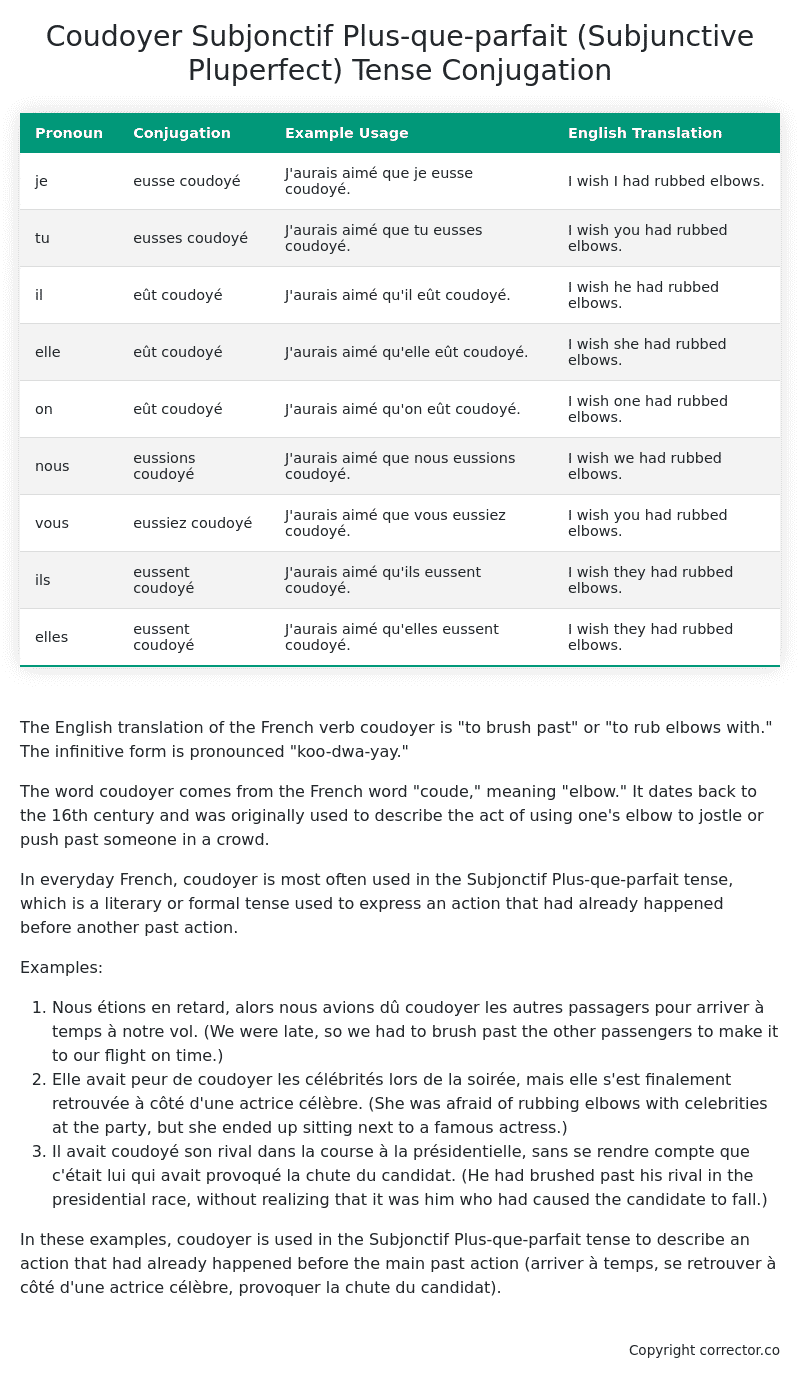Subjonctif Plus-que-parfait (Subjunctive Pluperfect) Tense Conjugation of the French Verb coudoyer
Introduction to the verb coudoyer
The English translation of the French verb coudoyer is “to brush past” or “to rub elbows with.” The infinitive form is pronounced “koo-dwa-yay.”
The word coudoyer comes from the French word “coude,” meaning “elbow.” It dates back to the 16th century and was originally used to describe the act of using one’s elbow to jostle or push past someone in a crowd.
In everyday French, coudoyer is most often used in the Subjonctif Plus-que-parfait tense, which is a literary or formal tense used to express an action that had already happened before another past action.
Examples:
- Nous étions en retard, alors nous avions dû coudoyer les autres passagers pour arriver à temps à notre vol. (We were late, so we had to brush past the other passengers to make it to our flight on time.)
- Elle avait peur de coudoyer les célébrités lors de la soirée, mais elle s’est finalement retrouvée à côté d’une actrice célèbre. (She was afraid of rubbing elbows with celebrities at the party, but she ended up sitting next to a famous actress.)
- Il avait coudoyé son rival dans la course à la présidentielle, sans se rendre compte que c’était lui qui avait provoqué la chute du candidat. (He had brushed past his rival in the presidential race, without realizing that it was him who had caused the candidate to fall.)
In these examples, coudoyer is used in the Subjonctif Plus-que-parfait tense to describe an action that had already happened before the main past action (arriver à temps, se retrouver à côté d’une actrice célèbre, provoquer la chute du candidat).
Table of the Subjonctif Plus-que-parfait (Subjunctive Pluperfect) Tense Conjugation of coudoyer
| Pronoun | Conjugation | Example Usage | English Translation |
|---|---|---|---|
| je | eusse coudoyé | J’aurais aimé que je eusse coudoyé. | I wish I had rubbed elbows. |
| tu | eusses coudoyé | J’aurais aimé que tu eusses coudoyé. | I wish you had rubbed elbows. |
| il | eût coudoyé | J’aurais aimé qu’il eût coudoyé. | I wish he had rubbed elbows. |
| elle | eût coudoyé | J’aurais aimé qu’elle eût coudoyé. | I wish she had rubbed elbows. |
| on | eût coudoyé | J’aurais aimé qu’on eût coudoyé. | I wish one had rubbed elbows. |
| nous | eussions coudoyé | J’aurais aimé que nous eussions coudoyé. | I wish we had rubbed elbows. |
| vous | eussiez coudoyé | J’aurais aimé que vous eussiez coudoyé. | I wish you had rubbed elbows. |
| ils | eussent coudoyé | J’aurais aimé qu’ils eussent coudoyé. | I wish they had rubbed elbows. |
| elles | eussent coudoyé | J’aurais aimé qu’elles eussent coudoyé. | I wish they had rubbed elbows. |
Other Conjugations for Coudoyer.
Le Present (Present Tense) Conjugation of the French Verb coudoyer
Imparfait (Imperfect) Tense Conjugation of the French Verb coudoyer
Passé Simple (Simple Past) Tense Conjugation of the French Verb coudoyer
Passé Composé (Present Perfect) Tense Conjugation of the French Verb coudoyer
Futur Simple (Simple Future) Tense Conjugation of the French Verb coudoyer
Futur Proche (Near Future) Tense Conjugation of the French Verb coudoyer
Plus-que-parfait (Pluperfect) Tense Conjugation of the French Verb coudoyer
Passé Antérieur (Past Anterior) Tense Conjugation of the French Verb coudoyer
Futur Antérieur (Future Anterior) Tense Conjugation of the French Verb coudoyer
Subjonctif Présent (Subjunctive Present) Tense Conjugation of the French Verb coudoyer
Subjonctif Passé (Subjunctive Past) Tense Conjugation of the French Verb coudoyer
Subjonctif Imparfait (Subjunctive Imperfect) Tense Conjugation of the French Verb coudoyer
Subjonctif Plus-que-parfait (Subjunctive Pluperfect) Tense Conjugation of the French Verb coudoyer
Conditionnel Présent (Conditional Present) Tense Conjugation of the French Verb coudoyer
Conditionnel Passé (Conditional Past) Tense Conjugation of the French Verb coudoyer
L’impératif Présent (Imperative Present) Tense Conjugation of the French Verb coudoyer
L’infinitif Présent (Infinitive Present) Tense Conjugation of the French Verb coudoyer
(this article)
Struggling with French verbs or the language in general? Why not use our free French Grammar Checker – no registration required!
Get a FREE Download Study Sheet of this Conjugation 🔥
Simply right click the image below, click “save image” and get your free reference for the coudoyer Subjonctif Plus-que-parfait tense conjugation!

Coudoyer – About the French Subjonctif Plus-que-parfait (Subjunctive Pluperfect) Tense
Formation
Common Everyday Usage Patterns
Hypothetical Situations
Reported Speech
Doubt, Wishes, and Emotions
Interactions with Other Tenses
Present Subjunctive
Imperfect Subjunctive
Conditional
Summary
I hope you enjoyed this article on the verb coudoyer. Still in a learning mood? Check out another TOTALLY random French verb conjugation!


